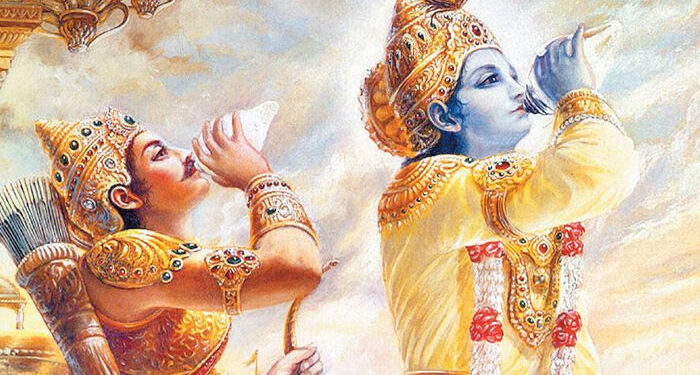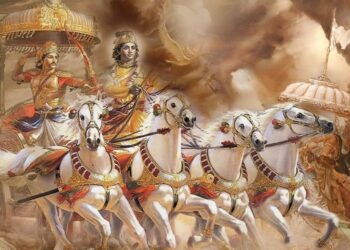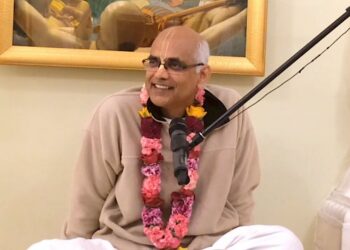TEXT 43
tatra taṁ buddhi-saṁyogaṁ
labhate paurva-dehikam
yatate ca tato bhūyaḥ
saṁsiddhau kuru-nandana
SYNONYMS
tatra—thereupon; tam—that; buddhi—saṁyogam—revival of consciousness; labhate—gains; paurva—dehikam—from the previous body; yatate—he endeavors; ca—also; tataḥ—thereafter; bhūyaḥ—again; saṁsiddhau—for perfection; kuru—nandana—O son of Kuru.
TRANSLATION
On taking such a birth, he revives the divine consciousness of his previous life, and he again tries to make further progress in order to achieve complete success, O son of Kuru.
PURPORT
King Bharata, who took his third birth in the family of a good brāhmaṇa, is an example of good birth for the revival of previous transcendental consciousness. King Bharata was the emperor of the world, and since his time this planet has been known among the demigods as Bhārata-varṣa. Formerly it was known as Ilāvṛta-varṣa. The emperor, at an early age, retired for spiritual perfection but failed to achieve success. In his next life he took birth in the family of a good brāhmaṇa and was known as Jaḍa Bharata because he always remained secluded and did not talk to anyone. And later on he was discovered as the greatest transcendentalist by King Rahūgaṇa. From his life it is understood that transcendental endeavors, or the practice of yoga, never go in vain. By the grace of the Lord the transcendentalist gets repeated opportunities for complete perfection in Kṛṣṇa consciousness.
TEXT 44
pūrvābhyāsena tenaiva
hriyate hy avaśo ‘pi saḥ
jijñāsur api yogasya
śabda-brahmātivartate
SYNONYMS
pūrva—previous; abhyāsena—by practice; tena—by that; eva—certainly; hriyate—is attracted; hi—surely; avaśaḥ—automatically; api—also; saḥ—he; jijñāsuḥ—inquisitive; api—even; yogasya—about yoga; śabda—brahma—ritualistic principles of scriptures; ativartate—transcends.
TRANSLATION
By virtue of the divine consciousness of his previous life, he automatically becomes attracted to the yogic principles—even without seeking them. Such an inquisitive transcendentalist stands always above the ritualistic principles of the scriptures.
PURPORT
Advanced yogīs are not very much attracted to the rituals of the scriptures, but they automatically become attracted to the yoga principles, which can elevate them to complete Kṛṣṇa consciousness, the highest yoga perfection. In the Śrīmad-Bhāgavatam (3.33.7), such disregard of Vedic rituals by the advanced transcendentalists is explained as follows:
aho bata śva-paco ‘to garīyān
yaj-jihvāgre vartate nāma tubhyam
tepus tapas te juhuvuḥ sasnur āryā
brahmānūcur nāma gṛṇanti ye te
“O my Lord! Persons who chant the holy names of Your Lordship are far, far advanced in spiritual life, even if born in families of dog-eaters. Such chanters have undoubtedly performed all kinds of austerities and sacrifices, bathed in all sacred places, and finished all scriptural studies.”
The famous example of this was presented by Lord Caitanya, who accepted Ṭhākura Haridāsa as one of His most important disciples. Although Ṭhākura Haridāsa happened to take his birth in a Muslim family, he was elevated to the post of nāmācārya by Lord Caitanya due to his rigidly attended principle of chanting three hundred thousand holy names of the Lord daily: Hare Kṛṣṇa, Hare Kṛṣṇa, Kṛṣṇa Kṛṣṇa, Hare Hare/ Hare Rāma, Hare Rāma, Rāma Rāma, Hare Hare. And because he chanted the holy name of the Lord constantly, it is understood that in his previous life he must have passed through all the ritualistic methods of the Vedas, known as śabda-brahma. Unless, therefore, one is purified, one cannot take to the principles of Kṛṣṇa consciousness or become engaged in chanting the holy name of the Lord, Hare Kṛṣṇa.



















